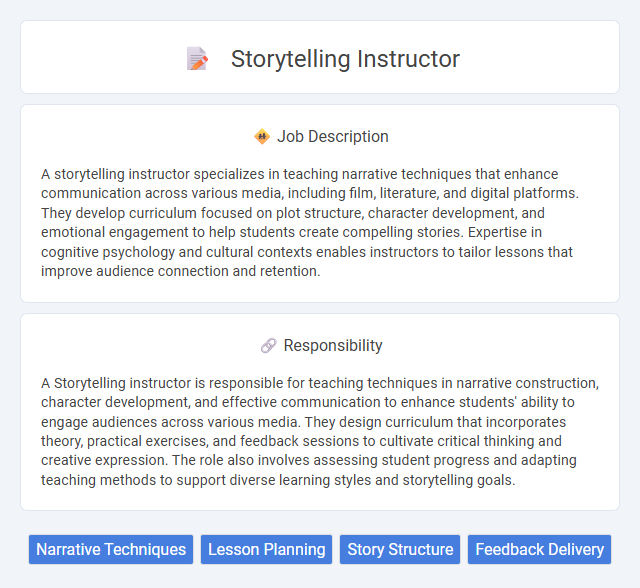
A storytelling instructor specializes in teaching narrative techniques that enhance communication across various media, including film, literature, and digital platforms. They develop curriculum focused on plot structure, character development, and emotional engagement to help students create compelling stories. Expertise in cognitive psychology and cultural contexts enables instructors to tailor lessons that improve audience connection and retention.
People with strong communication skills and a passion for narratives are likely to thrive as storytelling instructors. Those who enjoy engaging diverse audiences and inspiring creativity may find the role particularly suitable. Individuals struggling with public speaking or lacking patience for iterative learning might face challenges in this position.
Qualification
A storytelling instructor must possess strong communication skills and expertise in narrative techniques across various media formats, including text, video, and digital platforms. Proficiency in creative writing, public speaking, and audience engagement strategies is essential, alongside experience in teaching or workshop facilitation. A relevant degree in communications, literature, media studies, or related fields, paired with a proven portfolio of storytelling projects or publications, significantly enhances qualification for this role.
Responsibility
A Storytelling instructor is responsible for teaching techniques in narrative construction, character development, and effective communication to enhance students' ability to engage audiences across various media. They design curriculum that incorporates theory, practical exercises, and feedback sessions to cultivate critical thinking and creative expression. The role also involves assessing student progress and adapting teaching methods to support diverse learning styles and storytelling goals.
Benefit
A Storytelling instructor likely enhances a learner's ability to communicate ideas effectively, making their narratives more engaging and memorable. This increased skill in storytelling could improve professional presentations, marketing, and personal interactions. Mastery in storytelling might also boost creativity and confidence, providing valuable tools for various career paths.
Challenge
Storytelling instructor roles likely pose the challenge of adapting narrative techniques to diverse learning styles while maintaining engagement. It may require developing innovative methods to help students overcome creative blocks and build confidence in their storytelling abilities. Constantly evolving audience expectations could also demand staying current with emerging trends in storytelling formats and technologies.
Career Advancement
Storytelling instructors develop essential communication and narrative skills that are highly valued across marketing, education, and media industries, offering significant potential for career advancement. Mastery in storytelling techniques enables professionals to transition into roles such as content strategists, creative directors, or corporate trainers, expanding their leadership and influence. Continuous skill enhancement and industry networking further accelerate job growth and opportunities in diverse sectors.
Key Terms
Narrative Techniques
Mastering narrative techniques is essential for a storytelling instructor to effectively teach how to craft compelling stories that engage and resonate with audiences. These instructors emphasize elements such as plot structure, character development, pacing, and thematic consistency to enhance storytelling skills. Proficiency in these techniques enables students to create vivid, memorable narratives that convey meaning and evoke emotional responses.
Lesson Planning
A storytelling instructor specializing in lesson planning crafts dynamic curricula that integrate narrative techniques and audience engagement strategies to enhance learning outcomes. Effective lesson plans incorporate multimedia resources, character development exercises, and cultural context to build students' storytelling skills comprehensively. Detailed assessment criteria and adaptable modules ensure lessons meet diverse learner needs, fostering creativity and confidence in storytelling abilities.
Story Structure
A Storytelling instructor specializes in teaching narrative frameworks that enhance audience engagement by mastering story structure components like exposition, rising action, climax, and resolution. Expertise in outlining techniques and character development enables instructors to guide students in crafting compelling, cohesive stories aligned with industry standards. Proficiency in diverse genres and digital storytelling platforms equips instructors to adapt lessons for varying creative and professional contexts.
Feedback Delivery
A Storytelling instructor specializing in feedback delivery cultivates a supportive environment that promotes constructive critique, enhancing students' narrative skills and confidence. This role requires expertise in identifying strengths and areas for improvement, utilizing precise language to guide storytellers toward clarity, emotional engagement, and audience connection. Mastery in feedback techniques ensures that individuals refine their storytelling abilities effectively while maintaining motivation and creativity.
 kuljobs.com
kuljobs.com